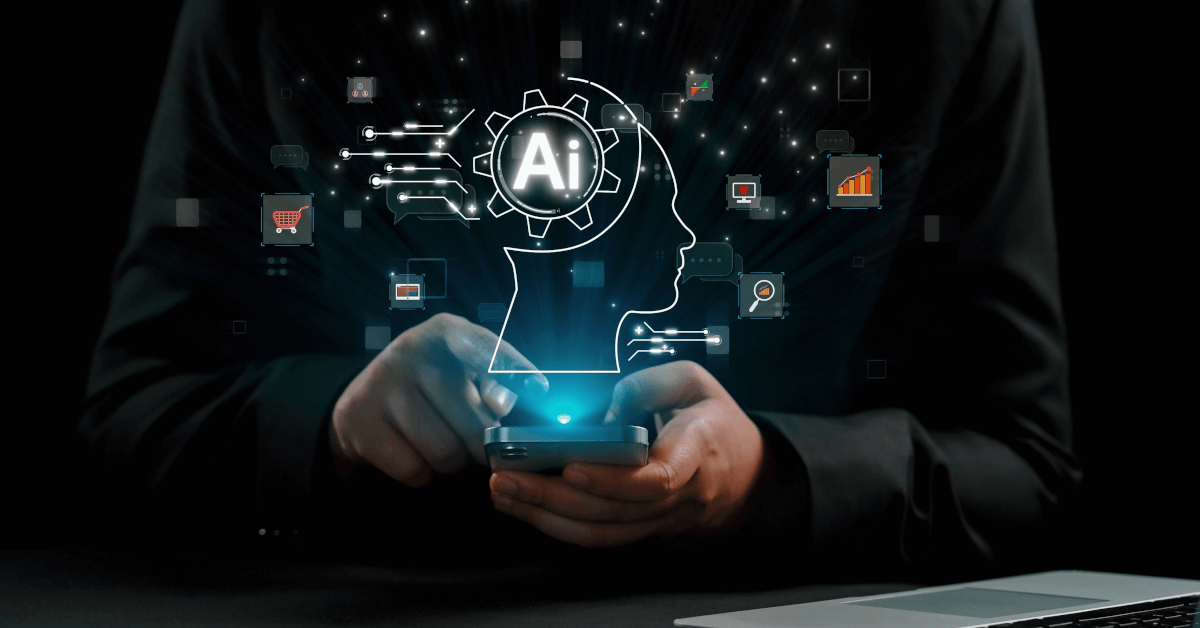Feeling overwhelmed by all the buzz around AI? Not sure if and how it applies to your small business marketing campaigns?
If so, you’re not alone. Many small business owners are concerned about the cost and practicality of implementing AI solutions. And there’s no one right answer for everyone. But AI can be a useful and low-cost tool with tangible benefits.
This guide explores how you might leverage AI tools to enhance your small business marketing efforts and compete more effectively. Let’s get started!
The Marketing Potential of AI Technology
AI may not be the ‘miracle solution’ it’s sometimes painted as. However, it does have its uses. One of those is providing small businesses with functionality that can serve as a substitute for expensive tools or a huge time investment.
The right kind of AI technology can help you automate tasks, analyze data, and personalize customer experiences. In particular, integrating AI into your marketing strategy offers several key advantages:
- Laser-focused targeting and segmentation. AI algorithms can analyze lots of customer data to identify patterns, preferences, and buying behaviors. This allows you to create highly targeted marketing campaigns that resonate with specific segments of your audience.
- Improved campaign performance and ROI. AI tools help optimize your digital marketing campaigns in real time. They achieve this by dynamically adjusting bids, targeting parameters, and even creative elements.
- Increased efficiency and productivity. AI takes some of the tedious, repetitive marketing tasks off your plate. You can automate aspects of email marketing, social media posting, and ad campaign management.
- Customer insights and predictive analytics. AI tools like Optimizely can analyze customer behavior and market trends to provide insights.
- Personalized customer experiences at scale. Your marketing team can use AI to deliver personalized content, offers, and recommendations to each individual customer, even with a large audience.
4 Key Applications of AI in Small Business Marketing
So you’re interested in using AI to boost your marketing efforts, but you’re not sure where or how? We can’t tell you what’s best for your business. However, we can give you some ideas to get started with.
Here’s how AI can be leveraged in four key marketing realms: content creation, email marketing, social media, and paid advertising.
1. AI-Powered Content Creation
Content marketing is the cornerstone of any successful marketing strategy. It can be time-consuming, though.
AI is still pretty bad at creating quality, useful content, especially anything that’s more than a few paragraphs long. But it can help you produce a wide range of content more quickly and efficiently.
ChatGPT and similar tools are great for gathering ideas and even starting outlines for long-form content like blog posts and email newsletters. They’re also decent at generating smaller content such as social media updates and product descriptions – you may only need to lightly edit the results.
These time savers increase your output without the need to expand your marketing team. Plus, the added inspiration saves your team from the dreaded writer’s block.
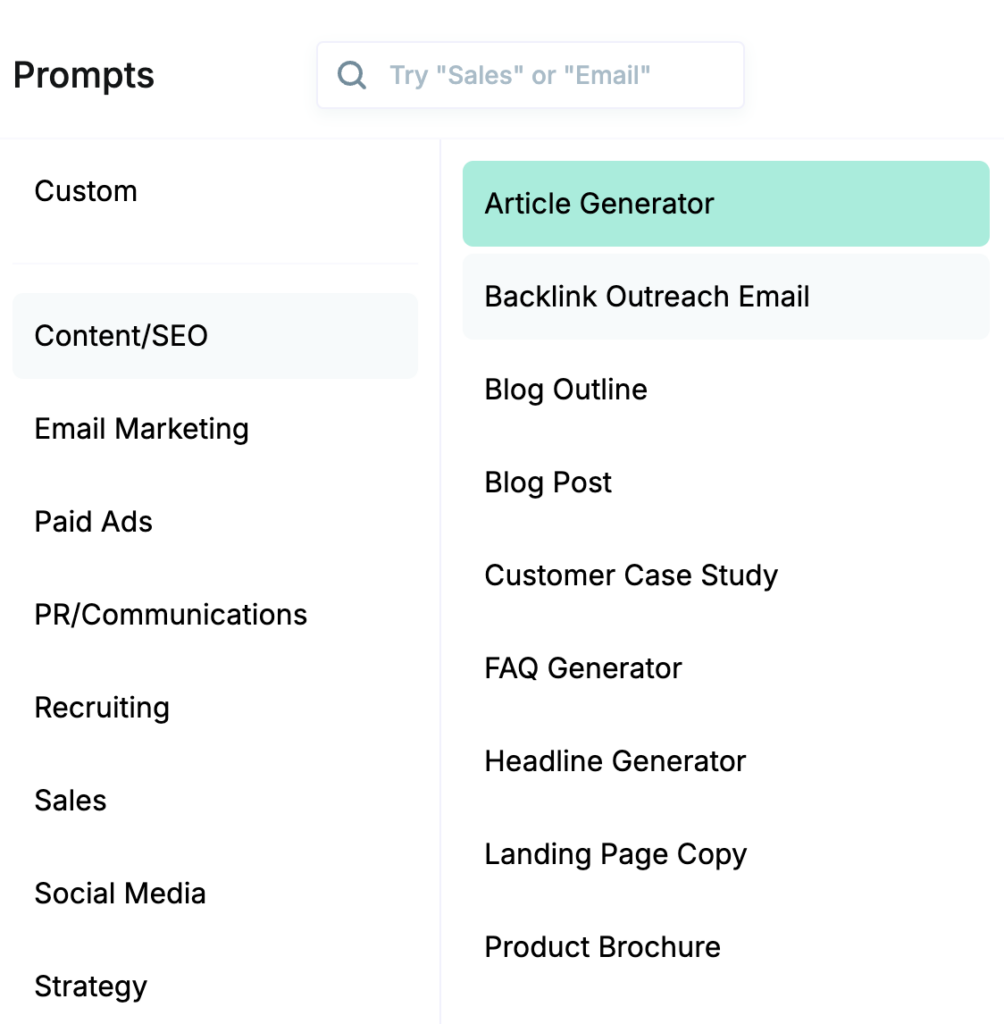
As for AI writing tools like Grammarly, they’re excellent for improving grammar, style, and clarity. As a result, the content you put out there will be more polished and professional. These tools also suggest relevant topics and keywords to enhance your content’s reach.
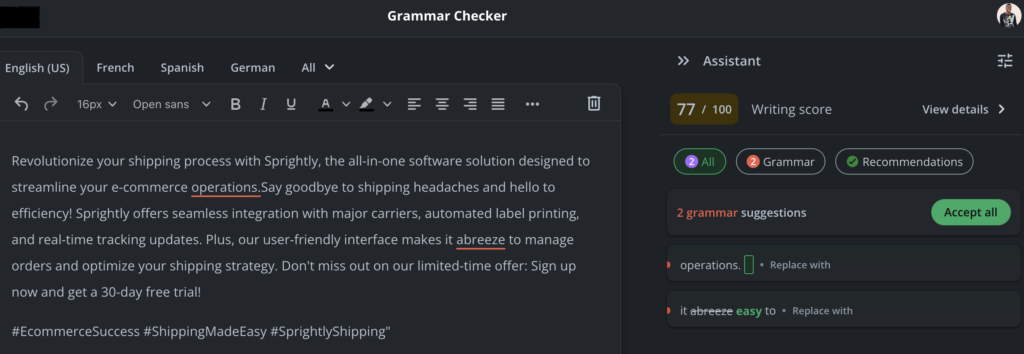
A few other tools worth checking out:
- Generating engaging content. Jasper is a helpful assistant for writing long-form content like blog posts, while Copy.ai is great for shorter-form text like social media captions and ad copy.
- Optimizing content for SEO. Tools like SurferSEO and Frase.io analyze top-ranking content for your target keywords, and provide recommendations on how to optimize for search engines.
Just keep in mind that AI isn’t a replacement for human creativity and judgment. We’d never recommend using any AI-generated content as-is. At the very least, it’ll need a human review and edit to improve quality, reflect branding, and ensure accuracy.

To sum up, here’s how you can start using AI effectively in content creation:
- Define your content goals. For example, would you like to increase blog traffic? Or is your end goal to improve social engagement?
- Choose an AI writing tool that suits your business needs and budget. Not sure which one to start with? Most offer free trials or limited versions you can test out.
- Experiment with different prompts and settings to find what works best for your brand voice. It is very important that you take time on this step. The content AI returns by default is very generic, but you can teach it to return more specific and relevant results.
- Set clear guidelines for AI use. Define what your content team should and shouldn’t use AI for, and ensure that everyone is on the same page. This is also a good time to put an editorial process in place, so nothing goes straight from AI to your customers without the necessary human touch.
2. AI for Email Marketing
Email marketing campaigns are powerful tools for connecting with customers. But just like every effort to grow your business, managing effective campaigns is a lot of work.
Small businesses can leverage AI to streamline email marketing campaigns, personalize messages, and ultimately improve the results. Here are some ways you might do that:
- Hyper-personalization. You can use tools like Peak.ai to analyze customer data and segment your audience based on demographics, behavior, purchase history, and preferences. This lets you send highly targeted emails that resonate with customers.
- Improved open rates and click-through rates. Your marketing team can use AI to optimize subject lines and email copy, in order to maximize open and click-through rates. Jacquard, for example, analyzes vast amounts of data to identify the most effective language and phrasing for your target audience.
- Automated email workflows. AI can be used to automate your email workflow, from welcome emails to abandoned cart reminders and post-purchase follow-ups. This ensures timely and relevant communication with customers.
- Enhanced deliverability. AI can help you maintain a healthy email list. Tools like ZeroBounce identify and remove inactive or invalid email addresses. This improves your sender reputation and ensures that messages reach your target audience.
You may not even need to seek out third-party tools. Email marketing platforms like Mailchimp typically offer AI-powered features for audience segmentation and automated email workflows.
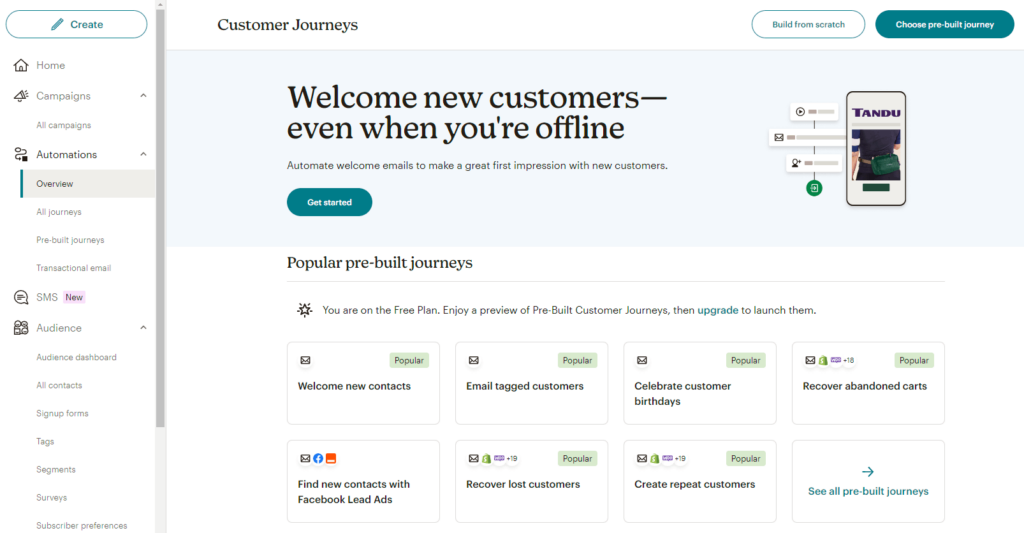
Just don’t leave your entire email marketing strategy up to the machines! Oversight is crucial. You can A/B test AI-generated subject lines and other content to see what’s most effective. Also, it’s vital to monitor your campaign performance and make adjustments based on customer feedback.
3. AI for Social Media Marketing
Social media is essential for all businesses, large and small. There’s no better way to meet customers where they’re at and engage them directly.
But if you know anything about managing multiple social platforms, it can be demanding. Especially because quick responses are paramount.
So how can your small business use AI for social media marketing? You can leverage it to manage:
- Automated posting and scheduling. You can use HighLevel and similar AI-powered tools to automate social media marketing schedules. This helps with uploading content at consistent times.
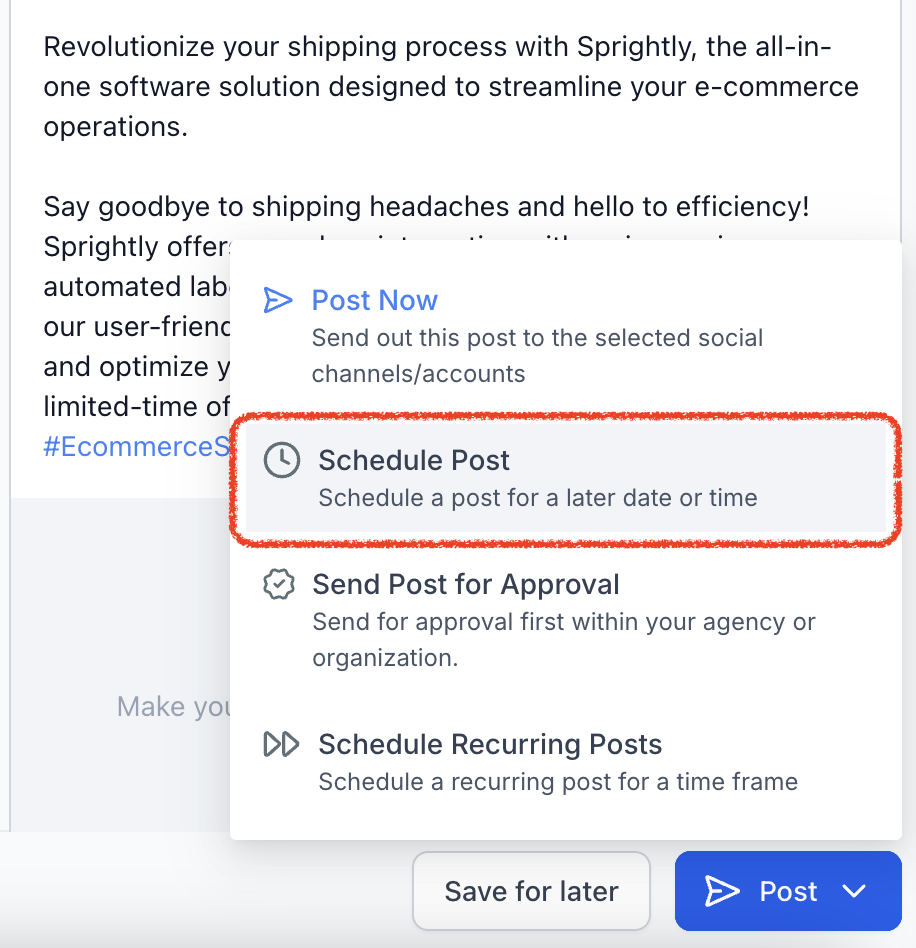
- Enhanced social listening and sentiment analysis. There are AI-powered social listening tools like Brand24 and Mention that monitor brand mentions, industry trends, and customer sentiment. You can keep track of what people are saying about your brand, and use those insights to improve its image.
- Improved content performance. Some AI platforms can analyze your social media performance data. They give you reports on the best times to post, the most engaging content formats, and the optimal hashtags to use.

- Targeted advertising. AI can optimize your social media advertising campaigns by targeting specific demographics, interests, and behaviors. This increases your return on investment by ensuring that the most relevant audience sees your ads.
Some platforms even help with most of this at once. Options like Hootsuite and Go High Level integrate AI features for scheduling posts, analyzing performance, and even suggesting content ideas. They can also help you manage multiple social media accounts from a single dashboard, streamlining your workflow.
While AI can help your small business with the many aspects of social media marketing, though, this doesn’t mean you should do away with your marketing team. You need genuine human interaction when connecting with your customers.
Relying too heavily on AI for messaging to your customers isn’t the best move for small businesses. It’s essential to maintain an authentic connection with your customers, and that’s hard when there isn’t a human at the wheel.
4. AI for Paid Advertising
Along with being expensive, paid advertising is often a lot of work. You need to manage bids, tweak targeting, and constantly test different copy to see what’s most effective.
AI can help by analyzing data and making micro-adjustments to optimize your campaigns. This means you can get more bang for your buck, as you reach the right people with the right message at the right time.
Once more, this doesn’t mean you should fire your marketing team. Strategy is still key. You’ll need to spend time understanding your target audience, coming up with your brand message, and defining your campaign goals.
AI tools then come in handy, to help with the tedious, time-consuming tasks of optimization and testing. What’s available will depend largely on the platform you’re using, but look for:
- Automated campaign optimization. With the help of AI tools like Albert.ai, you can tweak your bids, adjust your budget allocation, and refine your targeting based on real-time performance data. Even Google Ads offers plenty of functionality in this area.
- Ad creative power-up. AI platforms like AdCreative.ai help you generate and test ad variations. This lets you analyze which ones are the best fit for your campaign.
A few tips for managing AI-assisted paid advertising campaigns:
- Start small, think big. Don’t go all-in right away. Dip your toes in the water with a small budget for AI-powered campaign optimization. This gives you a chance to use your marketing budget more effectively.
- Embrace the experiment. Use AI to test different ad creatives. Don’t be afraid to try out various visuals, messaging, and calls to action.
- Stay in control. Remember that AI is a tool, not a replacement for your marketing expertise. Monitor your campaign performance, analyze the data, and make strategic decisions based on your overall business goals.
Bringing New Buyers In, and Turning Them Into Loyal Long-Term Customers
AI offers a lot of potential for small businesses in particular. It can be used to level the playing field, providing improvements in efficiency, engagement, and ROI for a fairly low buy-in.
You can use AI to generate content ideas, automate parts of your email marketing campaigns, optimize your social media presence, and supercharge your paid advertising. It’s no replacement for human oversight, but it does help with tedious and repetitive tasks – so you can spend more time connecting with customers.
In other words, AI-powered tools handle the heavy lifting in small business marketing, and free you up to focus on strategy, creativity, and building those all-important relationships.
If everything goes well, you’ll be bringing in plenty of new customers. The next challenge is to keep them happy. For a seamless customer support experience that saves time and improves loyalty, check out Groove!
Our help desk is built for small businesses, offers plenty of help for your human support agents, and incorporates smart AI features to streamline your workflows. Take advantage of a free trial today, and see the difference it makes to customer satisfaction and retention.


